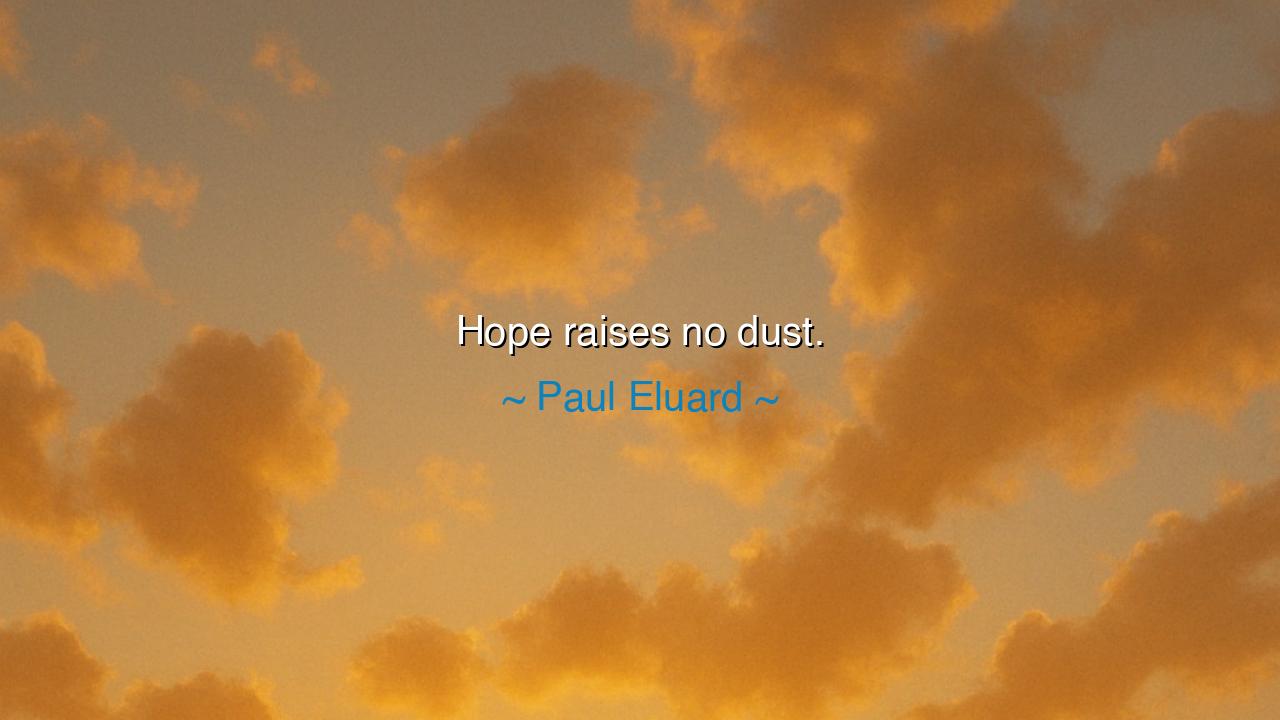
Hope raises no dust.






The French poet and dreamer Paul Éluard, whose words flowed like quiet rivers through the landscape of war and longing, once wrote: “Hope raises no dust.” This phrase, at first gentle and almost fragile, carries within it the profound stillness of the human soul when it chooses faith over despair. It is not a cry of defiance, but a whisper of truth. Hope, he tells us, is not violent. It does not thrash or shout or disturb the earth with the restless struggle of fear. Rather, it moves in silence, like the morning light that touches the world without a sound. Where anger storms and pride shatters, hope walks softly—yet it endures longer than any battle cry.
To understand this, one must feel the contrast between dust and hope. Dust rises when chaos moves, when the feet of armies trample the ground, when destruction and confusion reign. Dust blinds the eye and fills the lungs—it is the residue of turmoil. But hope, Éluard reminds us, does not raise dust. It does not come from force or haste. It is the quiet conviction that beyond the ruins of the moment, something pure and eternal still waits. Hope is clean, invisible, and undisturbed, like a seed lying beneath the soil, patient through drought, certain of spring. Thus, Éluard teaches that the most powerful faith is not loud, but calm; not dramatic, but steady.
The origin of this quote can be traced to Éluard’s own life, a life shaped by love, war, and resistance. As one of France’s great surrealist poets, he wrote through the darkness of the Second World War, when hope itself seemed forbidden. He witnessed his nation under occupation, his friends imprisoned, his people silenced. And yet, in that silence, he found a light that could not be extinguished—the quiet resilience of the human spirit. His words, “Hope raises no dust,” were not written from comfort, but from courage: from a man who saw that even in the midst of despair, true hope does not stir panic; it abides. It endures like the stars that shine unseen behind the storm clouds, waiting for the sky to clear.
Throughout history, we find living mirrors of this truth. Consider Anne Frank, the young girl who, hidden in a small attic during the Nazi occupation, wrote in her diary words that still echo through time: “I still believe, in spite of everything, that people are truly good at heart.” Her hope did not raise dust. She did not rage against fate or curse the darkness; she simply believed quietly, steadfastly, with a faith purer than fear. Her life, though short, became eternal because of that quiet light. Like Éluard, she understood that the greatest acts of courage are often silent—the unwavering calm of a heart that refuses to be corrupted by despair.
Dust belongs to the world of turmoil, but hope belongs to the world of spirit. The man who hopes truly does not need to shout or prove; he walks as one who trusts in the unseen. When a nation is at war, when a heart is in grief, hope becomes the invisible thread that holds all things together. It raises no dust because it does not destroy—it restores. It does not draw attention to itself, for its power lies not in motion, but in stillness. As the ancients said, “The strongest tree is the one that bends quietly with the wind.” So it is with hope—it does not resist the storm with fury, but with grace, and when the dust of chaos settles, it still stands.
And yet, in our modern world, people often mistake noise for power and impatience for strength. They chase change through shouting, through conflict, through restless motion that fills the air with dust. But Éluard’s wisdom warns us: the more dust we raise, the less clearly we can see. Hope does not blind—it clarifies. It opens the eyes to what truly matters, to what is worth saving, worth loving, worth enduring. In the midst of confusion, the hopeful heart is the one that breathes calmly and sees the way ahead when others see only clouds.
So, my child, take this lesson into your spirit: let your hope be still. Do not mistake its gentleness for weakness, nor its quiet for absence. Hope that endures is the kind that does not stir dust—it is pure, deep, and unwavering. Cultivate it not through words, but through actions: by believing in goodness when the world grows cruel, by planting seeds of kindness even when the soil seems barren, by trusting that light will return even when you stand in shadow.
For in the end, as Paul Éluard teaches us, true hope is not a storm—it is a dawn. It does not scatter the earth beneath your feet; it lifts your eyes to the horizon. It does not raise dust—it reveals the path. And when you learn to walk in that kind of hope, the world around you will grow still, and from that stillness, new life will begin again.






AAdministratorAdministrator
Welcome, honored guests. Please leave a comment, we will respond soon